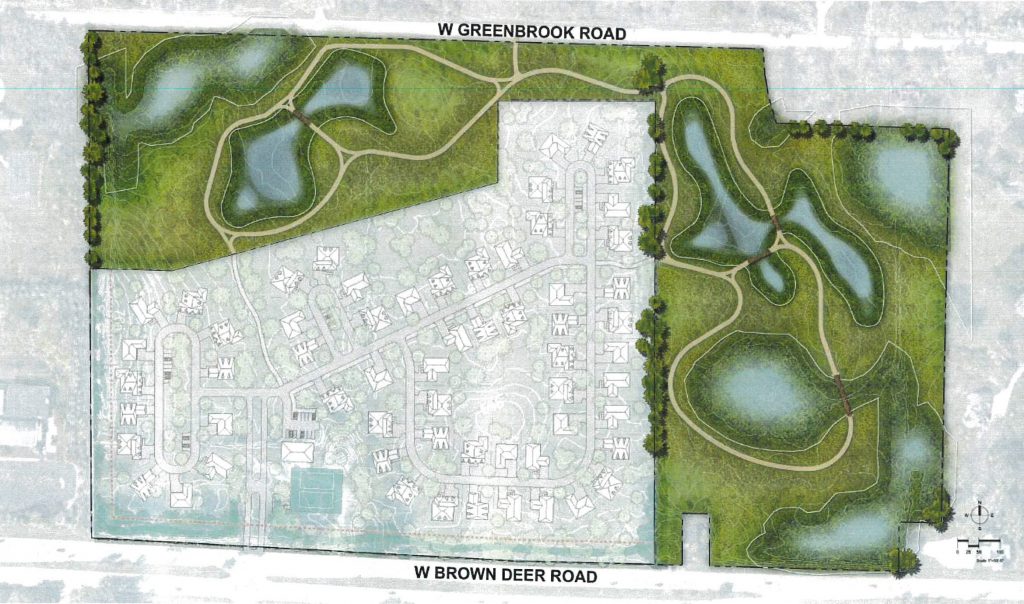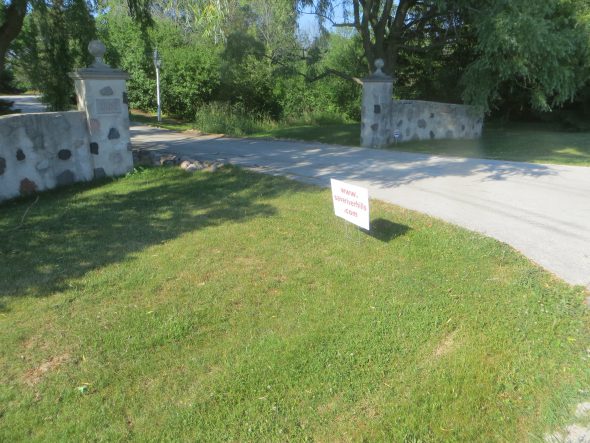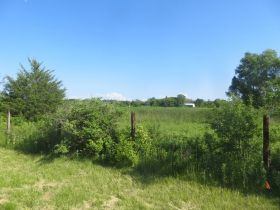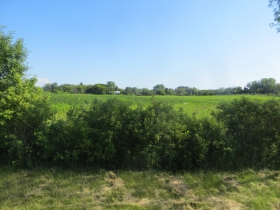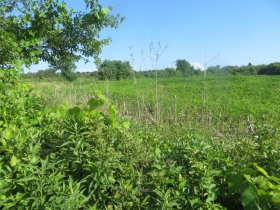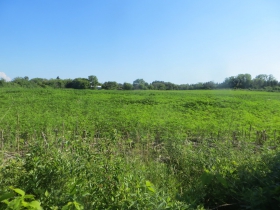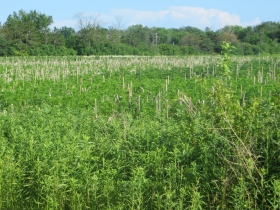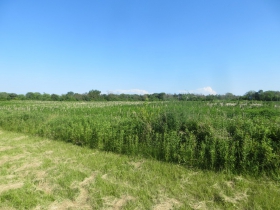River Hills Wetland Development Sparks Controversy
Residents oppose village board's plan to build 60 homes in area of unique watershed.
While municipalities nationwide consider eliminating single family zoning districts, the Village of River Hills remains staunchly in favor of them. In fact, that is the only permitted zoning in the community. What’s more, the single family homes must be on lots with a minimum size of five acres. In 2016 the village rejected a plan to zone a single parcel for apartments on an environmentally sensitive site after significant resistance from residents.
Today, a plan advanced by the village to eliminate its 5-acre lot size requirement for the construction of 60 homes on that same site has once again embroiled the community in controversy, pitting most of its residents (who oppose development) against the elected officials there. Meanwhile, portents of doom loom in its financial future, pushing officials to pursue new development.
Now that the village is the owner, it is advancing a proposal to construct 60 single story detached residences, along with a community building and a tennis court, on 25 acres of the site. The remaining 28.4 acres are to be a preserve. The homes would range from 1,700 to 2,500 square feet — comfortably large by Milwaukee standards, but smaller than many River Hills garages.
Yet such a development would require a change in zoning, since the overwhelming majority of village land (83%) requires 5-acre minimum lot sizes. (The remaining zoning categories are 1- and 2-acre minimum.)
Citizens in the village have always overwhelmingly opposed such a change. Lawns bear signs reading “Save River Hills,” prompting passersby to wonder what on earth could possibly be going wrong here? The village’s proposal prompted a competing development plan not requiring a zoning change from a community group. The nine-member Plan Commission considered them both in a meeting Wednesday. They had a taxing decision to make.
State Levy Limits Complicate Matters
Like any other community in the state, the Village of River Hills, (1,600 residents in 651 households) may raise taxes only based on value added due to new construction. Unlike any other community in the state, River Hills is exclusively zoned for single family residences on multi-acre lots, with no commercial activity whatsoever save for The Milwaukee Country Club and the River Tennis Club, each private.
Since its incorporation in 1931, the village government was able to raise its levy to keep up with rising costs and demands for service as vast estates were whittled down to mere 5-acre plots and then developed. But between 2004 and 2017 only 23 new homes were built, with just 11 of them on previously vacant lots. (The remainder were tear-downs.) Other than Eder Farm, only 38 buildable parcels remain in the village. The Wisconsin Department of Administration estimates the village will need to construct 27 new homes over the next 20 years. As a factsheet for the proposal notes, “There are very few buildable lots in River Hills, so there cannot be significant ‘net new construction.'” The vise on municipal finances thus tightens.
According to a prophecy in the 2019 Village of River Hills Comprehensive Plan:
The tension between minimizing property tax increases and limiting development to single family houses on large lots is self-evident. Village leaders will undoubtedly wrestle greatly with these controversial issues during the ten-year period anticipated by this plan.” [Emphasis original.]
The Village’s Plan
The village hired designer Carolyn Esswein to propose a development plan for the site, outlined above. She told the 52 participants of the Zoom meeting last week that there is a need “for a type of home that doesn’t exist at the current time.” She suggested that the development “could be for a 55 and older community,” leading one participant to archly note, “That’s what Saint John’s on the Lake is for.”
What she probably meant was that the homes would not appeal to families with children who might attend the Indian Hill Elementary School down the street, further burdening taxpayers.
The remaining 28.4 acres would be a preserve with existing and constructed surface water features, natural landscaping and a trail with but a single access point according to a plan by landscape architect Jason Cooper. The village would make an arrangement with the Milwaukee Metropolitan Sewerage District to pay for the preserve’s construction and two years of maintenance under the MMSD program that seeks to capture the first half-inch of rainfall on each event systemwide so that it does not enter the sewerage system. According to Bre Plier, the district’s sustainability manager, MMSD hopes to add 40 million gallons of diversion per year systemwide over the next 14 years with similar projects until a goal of 750 million gallons is reached. Eder Farm preserve would add 8.5 million gallons per rainfall event to the existing 37.5 million gallons already contained. Despite its lofty name, River Hills has significant expanses of wetlands. This one is an undisturbed headwaters of a unique watershed. Pervasive drainage issues in the area would only be worsened by its development, opponents felt. So they organized and presented a counter-proposal.
A Competing Proposal
The plan was advanced by the Ad Hoc Committee on the Environment. Village resident Dr. Peter Thornquist, who lives in the only house on the only inhabited island in the Milwaukee River, made a presentation. His group would favor retaining the entire property as a preserve, calling it a “generational opportunity.” The Eder Farm, he points out, is the headwaters of Fish Creek, which drains portions of River Hills, Bayside and Mequon. The waters flow through a two-mile series of ravines before draining into Lake Michigan in Fairy Chasm, a nature preserve in Mequon. The geography is more reminiscent of Door County than of Milwaukee County, and Thornquist called it the “southernmost extent of what we know as the Northwoods.” Over the decades, the farm had been “only lightly plowed. … It is geology that has never been disturbed … there is an underground network of streams. Development would disturb the ecosystem.”
As a possible compromise, the committee suggested developing four five-acre sites along Greenbrook Road on the property’s northern border, while retaining the remaining acreage for the preserve.
Thornquist cited the Pukaite Woods preserve in Mequon and the Schlitz Audubon Nature Center in Bayside as examples of natural areas preserved in wealthy communities as a buffer against development. “Can anybody tell me why River Hills cannot do what Mequon, Bayside, Belgium have done? We are a resourceful, rich community.”
A Citizen Poll Finds 10 to 1 Against
Barry Snider, spoke for Save River Hills, a group founded in 2014 to oppose the development and any zoning change.
The group’s website offers this lament:
Our village trustees have been totally non-transparent when it comes to this proposed project and they have refused to poll village residents to determine their wishes.
So Snider bought some stationery and postage stamps and polled each and every household in the community (668, by his count). He received 400 responses, which he waved before the camera. That is a 61% response rate — pretty impressive. (It should be noted that 99% of village properties are owner occupied.)
He said that around 350 respondents wanted no development on the site, while 35 were open to the idea, and 14 said they would require more information. “Ten to one as of the Fourth of July,” he said, sealing his case.
He was followed by Victor Harding, a longtime resident and attorney who once ran for the village board on the grounds that the Milwaukee Country Club’s property was under-assessed. His plan would call for 6 properties on the site, and would preserve an existing farmhouse there, while maintaining the current zoning and proposed preserve. “Don’t futz” with the five acre minimum zoning, he said, referring to the village’s development plan as “Mandel Lite”. The Eder Farm generated $34,000 in property tax before it was taken off the rolls with the village’s purchase. His plan would generate $93,000 in annual tax payments, he said.
Robert Boucher, whose “Save River Hills” signs dot the area, cautioned that the village’s development plan would require connecting to a water utility at considerable expense and possible precedent, as the community is now served by private wells. (The country club uses 3.5 million gallons annually.) The village plan would increase population by 10 per cent, and could lead to downzoning attempts of other properties by developers in the future, he warned.
Original Plan Approved
The Plan Commission approved the original proposal by the village with a vote of 4 in favor, 3 opposed, 1 abstention and 1 recusal. The matter will go before the Village Board at its 5 p.m. Zoom meeting on July 21st.
Meanwhile the clock keeps ticking on the repayment of the TIF. The first two years of interest payments were included in the original funding. By 2023, the payments will be borne by taxpayers, if the village fails to increase its tax base by then. Otherwise, taxes are expected to rise by an estimated 6 per cent, forcing budget cuts elsewhere due to the state levy cap restrictions.
Village Wants No Crops on Land this Season
To date the village has spent $3,023,000 on the Eder Farm. This includes the purchase price as well as $314,000 in other expenditures, about half of which were legal fees. A total of $750 was spent on “ongoing maintenance” of the land.
Until this season, the Eder Farm was indeed an agricultural operation, growing corn for the ethanol market. Today, where a woodland preserve is envisioned, the property is rapidly devolving into a feral state, virtually entirely covered with invasive weeds. I contacted Schmit Farm Produce of Mequon, which leased the acreage in the past. I asked if they offered to farm the land this season and if the offer was declined by the village. I received this enlightening response:
Yes. Village of River Hills decided it was not going to be agricultural. I guess they believe that giant ragweed and other obnoxious species of weeds are more beneficial than soybeans or corn!
Rent could be between $50-$100 per acre — there are a lot of variables — but it would not have been producing invasive species and noxious weeds.
Why, if there is no immediate plan for the land wouldn’t River Hills consider something on the property until they have a plan?
- Plenty of Horne: “Group Fights River Hills Development” September 17th, 2017
- Plenty of Horne: “River Hills Buying 55 acre Site to Settle $3 Million Suit” August 15th, 2020
- Recording of Plan Commission Meetin
- Village proposal: Development-Proposal-7.7.21.pdf (riverhillswi.com)
- Committee on the Environment proposal
- Village of River Hills Comprehensive plan 2019 Update-Combined.pdf (riverhillswi.com)
- Save River Hills
Eder Farm
If you think stories like this are important, become a member of Urban Milwaukee and help support real, independent journalism. Plus you get some cool added benefits.
Plenty of Horne
-
Villa Terrace Will Host 100 Events For 100th Anniversary, Charts Vision For Future
 Apr 6th, 2024 by Michael Horne
Apr 6th, 2024 by Michael Horne
-
Notables Attend City Birthday Party
 Jan 27th, 2024 by Michael Horne
Jan 27th, 2024 by Michael Horne
-
Will There Be a City Attorney Race?
 Nov 21st, 2023 by Michael Horne
Nov 21st, 2023 by Michael Horne


